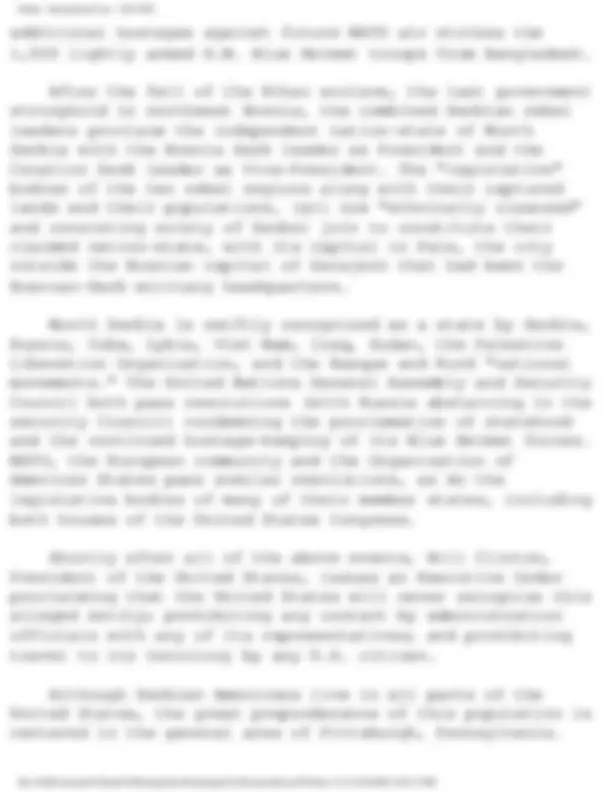




Study with the several resources on Docsity

Earn points by helping other students or get them with a premium plan


Prepare for your exams
Study with the several resources on Docsity

Earn points to download
Earn points by helping other students or get them with a premium plan
Community
Ask the community for help and clear up your study doubts
Discover the best universities in your country according to Docsity users
Free resources
Download our free guides on studying techniques, anxiety management strategies, and thesis advice from Docsity tutors
An analysis of the international law issues surrounding the dissolution of yugoslavia and the formation of the independent state of north serbia. The historical context of yugoslavia, the ethnic conflicts and genocide that ensued after its dissolution, and the recognition and condemnation of north serbia by various international organizations and countries. The document also explores the legal implications of the united states' refusal to recognize north serbia and the ensuing dispute between the pennsylvania and united states governments over a 'special trading relationship' with north serbia.
Typology: Exams
1 / 4

This page cannot be seen from the preview
Don't miss anything!



Sultan
International Law Fall 1994
The nation-state of Yugoslavia was a creature of the Treaty of Versailles. Carved out of the former Austria- Hungarian Empire and Ottoman (Turkish) Empire, it consisted of numerous often hostile Balkan ethnicities with differing religions, languages, and even written script. The place where the spark that led to World War I was ignited, Balkan wars were in fact occurring just prior to that larger conflict.
Held together by the will and personality of a World War II resistance hero, Marshal Tito, who ruled under a communist-style dictatorship, the governmental mechanism he established to hold the country together after his death began to dissolve shortly after the implosion of the Soviet Empire in 1989-90. First Slovenia, then Croatia, and finally Bosnia broke off and declared their independence from the former union that had been dominated by Serbia (the Yugoslav Capital was Belgrade, also the capital city of Serbia; Serbians had dominated the officer-corp of the Yugoslav
Army).
Pushed by the recognition by Germany of these three new nation-states, first the European community, then the United States and other nations, and finally the United Nations recognized them, and the latter admitted them to membership, as did other public international organizations.
Ethnic Serbs living in both Serbia and in pockets of Croatia and Bosnia desired the creation of a "Greater Serbia." Aided by the invasions and supplies of the Serbian Army first into Croatia and then into Bosnia, the Serbian
population of the those two new nation-states continued hostilities against these new states and their governments after the Serbian Army retreated to its home territory. In Croatia, rebel Serb forces gained control of 30 percent of the territory--all bordering on either Serbia or Bosnia-- before the civil conflict died down. The conflict in Bosnia continues, with the Bosnian Serbs presently controlling 70 percent of that new nation, and government forces, consisting largely but not completely of ethnic Moslems,
control the rest.
All of this conflict has been accompanied by massive incidents of Genocide (called "ethnic-cleansing"), political rape, torture, internment, population expulsion and other dislocations of the civilian populations. Although all three ethnic groups have perpetrated these acts, the overwhelming amount of them have been by the rebel Serbian forces. In fact, they have been virtually unresponsive (some claim contemptuous) towards a string of United Nations Security Council and General Assembly Resolutions, even to the point of killing, wounding, and taking hostage many of the approximately 24,000 UN (Blue-Helmet) "peacekeeping" forces who are, as best they can, providing food, medical assistance and other forms of humanitarian aid to the regions millions of inhabitants.
In mid-November, 1994, following the first successful limited offensive by Bosnian government forces, the Bosnian Serbs not only regained the recently lost territory, but continued their offensive into the government enclave around the City of Bihac, a United Nations designated "safe area" in northwestern Bosnia that had a common boundary with an area of Croatia held by the Croatian Serbs. After some unsuccessful NATO air strikes authorized by the UN Security Council, the Croatian Serbs joined their Bosnian "brothers" and completely occupied the Bihac region, killing, raping and expelling the largely Moslem population. They keep as
Very politically active on both the state and local level, at the present time, the Governor and a large faction of the state legislature are of Serbian extraction. After intense "political deal-making," the Pennsylvania legislature promulgates a bill funding a "special trading relationship" between the private industrial and other business activities located in Pennsylvania and their counterparts in Northern Serbia. The Governor swiftly implements the provisions of this bill establishing a state trading office in Pale, the North Serbian capital, a key to the effectuation of the remainder of the legislation. Shortly thereafter, the United States Attorney brings an action in Federal court requesting an injunction against the Governor seeking to nullify the legislation. In response, the Pennsylvania Attorney General claims that the implementation by the North Serbian government (in cooperation with Pennsylvania) establishing the Pale office was an Act of State. He further claims that the Federal courts cannot pass upon the merits of an Act of State, and that, therefore, the request for the injunction
should be denied, and the case dismissed.
What issues do the above facts present? How will they probably be resolved? why will they be resolved in that
manner?